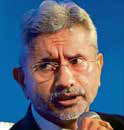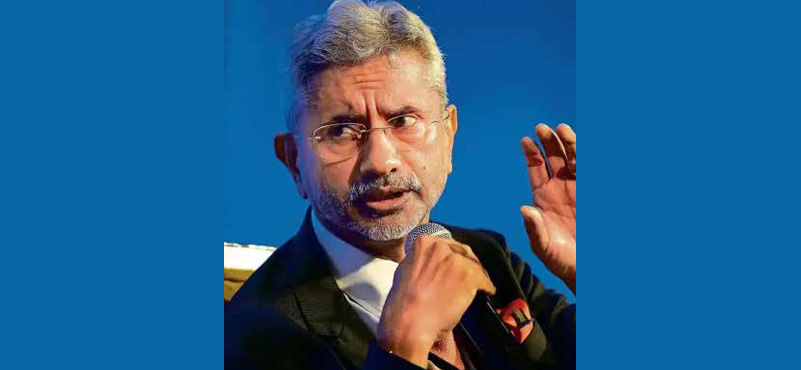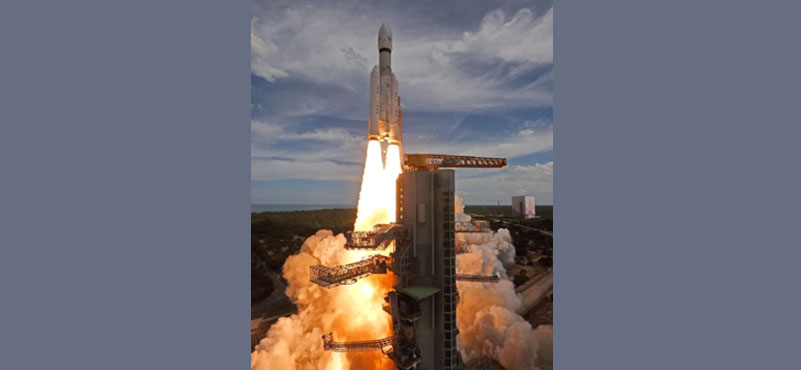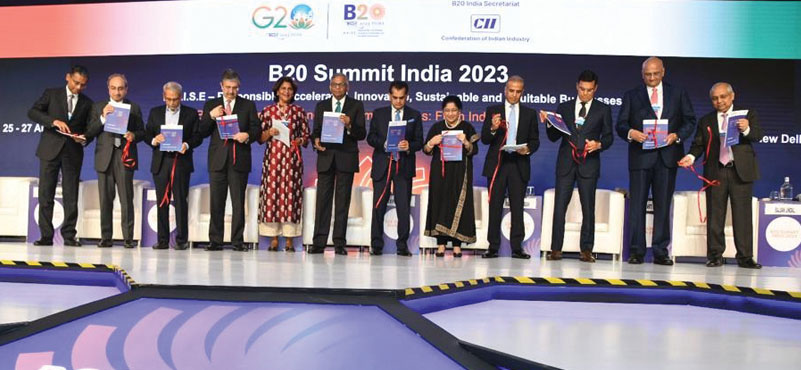EAM Jaishankar at the launch of Amitabh Kant’s book, ‘Made in India’, says we should stop looking at a China ‘fix’; important to find our own solutions, and equally important to ‘think in India’. Presented here are extracts of his presentation.
There is this legacy question which he really asks, what if the Bombay plan had worked out? And he of course, I think with good reason, asserts that it would have put the country on a very different trajectory. But the fact is that the politics of the day won out. And politics of the day will always win out, in when it comes to a big national decision, like that.
But, later on there is a little bit of an India China comparison. And the fact is that when we speak about, you know, the road not travelled, the trajectory not taken, the today, the gap that we have in comprehensive national power between China and India, which is such a big concern for us in the foreign policy field, I think, that is something worth thinking about because what often is debated as a foreign policy proposition is actually an economic outcome, I would say, a business outcome, in many ways. And I would also say, frankly, bluntly, that those who are most responsible for it are also apparently most in denial. So, having got that off my chest, let me come to the second proposition, which he raises. And this is the post 1991 paradox.
 The post 1991 paradox, I thought Amitabh has summed up very neatly in the proposition of the duality, of how we progressed, where you had wide ranging reforms, to quote him, in some areas. And you had the vestiges of the past, also continuing in many areas. And therefore, he says, we moved forward at two speeds. And I think that’s something, I mean, we all knew intuitively; he has, in a sense, verbalised that. But I know, you know, it is to me still today, the challenge that the country faces; which is, you know, instead of, shall I say, being complacent about the reforms which were done, perhaps we should have given and still keep giving more thought to the reforms which are not done, and which remain to be done, and how do we, how do we, in a sense go beyond this, two speed, situation and come to something which is, far more inclusive, far more unified, and far more impactful, in terms of the outcome it produces.
The post 1991 paradox, I thought Amitabh has summed up very neatly in the proposition of the duality, of how we progressed, where you had wide ranging reforms, to quote him, in some areas. And you had the vestiges of the past, also continuing in many areas. And therefore, he says, we moved forward at two speeds. And I think that’s something, I mean, we all knew intuitively; he has, in a sense, verbalised that. But I know, you know, it is to me still today, the challenge that the country faces; which is, you know, instead of, shall I say, being complacent about the reforms which were done, perhaps we should have given and still keep giving more thought to the reforms which are not done, and which remain to be done, and how do we, how do we, in a sense go beyond this, two speed, situation and come to something which is, far more inclusive, far more unified, and far more impactful, in terms of the outcome it produces.
There is also a third point of the pre 2014 era, which I think is worth flagging, particularly, when I see all of you know, who all are in the room. And this is the, the compulsions, or I would say the attractions and the impact of outward investments, outward investments by Indian enterprises. As someone today, who travels in what are considered relatively distant parts of the world and sees how strongly Indian business is establishing its footprint, and you start seeing the outlines of where we would be at the end of the decade or perhaps into the next decade. And this outward experience, I believe, will serve us very well when it comes to offering services, taking manufacturing abroad or insourcing resources. And I think all those are really prospects that the Indian economy will have to address, sooner rather than later.
So let me then fast forward to the post 2014 era.
 Now I would say there are some themes by which Amitabh has sought to capture all the transformation that we have. One, of course is the formalising of the economy, and he particularly, and rightly so, highlights the GST as the landmark reform, in that regard. The second is something in which he has had a particular contribution to make, and that is, improving our ease of doing business. And again, here as as a perspective of someone in the diplomatic world, I would say it was probably the biggest burden that we carried in diplomacy, that there won’t be an ambassador, Indian ambassador in the world who wouldn’t have had at some point to explain, in the country where he was, why we were such a difficult country to do business in!
Now I would say there are some themes by which Amitabh has sought to capture all the transformation that we have. One, of course is the formalising of the economy, and he particularly, and rightly so, highlights the GST as the landmark reform, in that regard. The second is something in which he has had a particular contribution to make, and that is, improving our ease of doing business. And again, here as as a perspective of someone in the diplomatic world, I would say it was probably the biggest burden that we carried in diplomacy, that there won’t be an ambassador, Indian ambassador in the world who wouldn’t have had at some point to explain, in the country where he was, why we were such a difficult country to do business in!
And that change, today has really raised our global stature, in the last decade. I will certainly put, the improved ease of doing business, as one of them.
The third one is the digital delivery which I think has improved governance. It has in many ways made growth truly inclusive. And I would say in a way, and I quote here a phrase, which Prime Minister often uses. We are a country have actually democratized technology, that we have made technology, both practically and aspirational, available to everybody.
And finally, the fourth theme, which he writes about, is the grassroots change.
In the aspirational sense my own district from where I am an MP, in Gujarat, mine is an aspirational district. And I have seen even in the space of the last four years, how much of a change there has been, as a result of that kind of focus. So, when I look at the post 2014 era, I think for me, this formalisation, the ease of doing business, the digitalization, and the grassroots delivery, I think these have really been the game changers. And as a political scientist, I would say, if you ask me today, what is the change in the politics of the country? I think we are today moving to a politics of delivery.
So, there are other aspects and thoughts that I would like to pick up from the book. One is the impact of the pandemic and what that means for all of us. I think there is no question that after the pandemic, we have entered an era where the focus is on de-risking the global economy. And that de-risking takes place in many forms, when it comes to manufacturing and supply chains, it is very much, I think the focus has shifted to building a more reliable and resilient supply chains. And that for us, is today the great opportunity when it comes to manufacturing. The second is in the digital domain.
 In a way, in the last decade, what has come out most in the open is the concern about where our data resides, where our data is processed, where it is harvested, where is the artificial intelligence created? And the focus today is on trust and transparency in the digital domain, I think this is overwhelming. The third thought for your consideration is actually the global polarization which makes diplomacy far more complex. But the global polarisation is also a window of opportunity for many nations. And I would suggest certainly for India; both economical and technological, because if this is about trust-centric digital activity, and a more resilient supply chain, I think these can really open up many new possibilities for India.
In a way, in the last decade, what has come out most in the open is the concern about where our data resides, where our data is processed, where it is harvested, where is the artificial intelligence created? And the focus today is on trust and transparency in the digital domain, I think this is overwhelming. The third thought for your consideration is actually the global polarization which makes diplomacy far more complex. But the global polarisation is also a window of opportunity for many nations. And I would suggest certainly for India; both economical and technological, because if this is about trust-centric digital activity, and a more resilient supply chain, I think these can really open up many new possibilities for India.
And finally, with regard to the pandemic and the prospects ahead. It appears that our destiny is to grow, but grow in a much more volatile world, but also in a much more decarbonized environment. So, India’s growth in that sense is going to be fundamentally different from anybody else who preceded it, not because it is necessarily one out of our choice. I think that is the environment, the global environment in which we find ourselves today. So, which really means in many ways, we have to think through and perhaps devise a growth strategy for which there’s really no precedent. So how do we take advantage of it? I think we take advantage of it, one, clearly once again by, getting the focus back on manufacturing because there is no major country in the world, which, which has sustained or enhanced its global position without some commensurate buildup of manufacturing.
I have always believed that this focus on services was actually an elegant excuse for being incompetent in manufacturing. I think the bottom line is that this country will never be a great country if it is not a great manufacturer. I think that’s something which we need to understand.
 The second, and I say this with a lot of business people in the room, I think we need to stop looking for a China fix. That Indian growth cannot be built on Chinese efficiency. That ultimately if we are really to sustain and take the economy to a different level, we have to create the kind of domestic vendor chain that a serious manufacturing economy will do. I know it is not something which will happen overnight. But I can tell you as someone in the government today, someone in the economic affairs cabinet committee, we take it as a priority that how do we build deep manufacturing, the deep manufacturing supply chains, which will be needed to do that.
The second, and I say this with a lot of business people in the room, I think we need to stop looking for a China fix. That Indian growth cannot be built on Chinese efficiency. That ultimately if we are really to sustain and take the economy to a different level, we have to create the kind of domestic vendor chain that a serious manufacturing economy will do. I know it is not something which will happen overnight. But I can tell you as someone in the government today, someone in the economic affairs cabinet committee, we take it as a priority that how do we build deep manufacturing, the deep manufacturing supply chains, which will be needed to do that.
I think the PLI scheme in that sense is that effort really to energise the economy, to motivate the economy, to get businesses to believe that it is possible to manufacture in this country.
The third point I would make is Make in India is not just about making, it is also about thinking. You have to think, it has to be ‘Think in India’ and think in a way, as I said, we are in a very unique circumstance, and I fully accept there are experiences and analogies, that we can take best practices from the rest of the world. But at the end of the day, I think we will have to think through our growth strategy for ourselves. We will have to think through solutions in difficulties for ourselves. And if you look at the last decade, every time we have been actually confronted with a major challenge, I would say, the fact is that we have really reflected on it in our own particular ethos and circumstances; these have actually been hugely helpful.
I would cite the Covid experience. I mean, at the time of COVID, other than the health advice we got from the rest of the world, we also got a lot of advice internally on how to economically handle the crisis. Honestly, I would say I am so glad we did not listen to much of it. We came up with your own solutions. I would say in a way it is even applies to our relationship with the world; in the name of opening the economy and globalizing, we should not end up de-industrializing our own country. We should not allow a level playing field in this country for others who subsidize their production. That is not level playing field but an economic suicide. Every country must support its manufacturers, must support its businesses. We must not let outside businesses enjoy advantages in our country at the expense of our own. In that sense, we must and have moved to strategic economics, have a clear sense, who are our partners, where are our opportunities, where should we focus on technology tie ups?
I actually see it as a strategic statement which has been implemented and conceptualized on the ground, by people like Amitabh.
And finally, what is our attitude towards business. You know, it is something which is rarely openly spoken about in this country. But the fact is, I mean, sometimes we have heard the term, you know, wealth creators. I think it does them gross injustice. Business people to me are capability creators. They are employment creators. They are people who actually reduce our national vulnerabilities. So, to me, actually, strong business is not only about the economy, it is to me a critical segment of national security.
ABOUT
 Jaishankar is a career diplomat, the first ever to also become India’s Foreign Minister. 1955 born, he is a Rajya Sabha member from Gujarat, educated from St Stephen’s College, Delhi and a JNU scholar.
Jaishankar is a career diplomat, the first ever to also become India’s Foreign Minister. 1955 born, he is a Rajya Sabha member from Gujarat, educated from St Stephen’s College, Delhi and a JNU scholar.




































